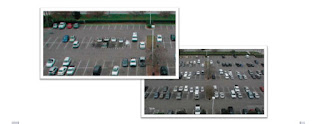What VFX & Compositing
What VFX & Compositing?
VFX
} In filmmaking, visual effects
abbreviated as VFX are the processes by which imagery is created
with the help of VFX & 3D Software.
} Visual effects involve the
integration of live action footage and Computer generated imagery to create
environment which look realistic, but would be dangerous, costly or simply
impossible to capture on film.
} Visual effects using Computer
generated Imagery (CGI) have become increasingly common in big budgets films
and have also recently become accessible to the amateur filmmaker with the
introduction of affordable animation and composting Software.
Compositing
} Compositing is the creative process of
assembling and combining filmed or rendered elements from multiple sources, to
create a final lifelike illusion or fantastical visual effect, delivered as a
set of still or moving pictures.
} Compositing is the Combining of
Visual elements from separate sources into single image, often to create
illusion that all those elements are part of same scene.
} Live Action shooting for
composting is variously called “blue Screen”, “Green Screen”, “and “Chroma Key”.
Today, most, though not all, composting achieved through digital image
manipulation.
} Digital Compositing is the
process of digitally assembling multiple images to make a final image,
typically for Motion Pictures or screen display. It is evolution into the digital realm of
optical film compositing.
VFX &SFX
Visual effects created
with help of VFX & 3D Software. Special Effects are those effects which are
created on set.
Terms related to VFX
Wire-Removal
} Wire removal is a visual
effects technique used to remove wires in films, where
the wires are originally included as a safety precaution or to
simulate flying in actors or miniatures. Wire removal can be partly
automated through various forms of keying, or each frame can be edited
manually.
Chroma Keying
} Chroma key compositing, or Chroma
keying, is a special effects / post-production technique
for compositing (layering)
two images or video streams together based on
color hues (Chroma range). The technique has been used heavily in many
fields to remove a background from the subject of a photo
or video – particularly the news casting, motion picture and videogame industries. A color range
in the top layer is made transparent, revealing another image behind. The Chroma
keying technique is commonly used in video production and
post-production.
Rotoscoping
} Rotoscoping is an animation
technique in which animators trace over footage, frame by frame, for use in
live-action and animated films. Originally, recorded live-action film images
were projected onto a frosted glass panel and re-drawn by an animator.
Cloning
} Cloning Technique is used to
remove or replicate some Elements.
Video tracking
} Video tracking is the
process of locating a moving object
(or multiple objects) over time using a camera. It has a variety of uses, some
of which are: human-computer interaction, security and surveillance, video
communication and compression,
augmented reality, traffic control, medical imaging and video
editing. Video tracking can be a time consuming process due to the amount
of data that is contained in
video.
Match moving
In visual effects, match moving is a technique that allows the insertion
of computer graphics into live-action footage with correct position, scale,
orientation, and motion relative to the photographed objects in
the shot.
Matte
painting
A matte painting is
a painted representation of a landscape, set, or distant location
that allows filmmakers to create the illusion of an environment that is not
present at the filming location.











Comments
Post a Comment